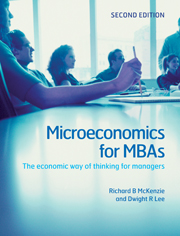Book contents
- Frontmatter
- Contents
- Preface
- How to use this book
- List of online perspectives
- List of further readings online
- List of online video modules
- Book I The market economy, overview and application
- Book II Demand and production theory
- 6 Consumer choice and demand in traditional and network markets
- 7 Production costs and the theory of the firm
- 8 Production costs in the short run and long run
- Book III Competitive and monopoly market structures
- References
- Index
7 - Production costs and the theory of the firm
from Book II - Demand and production theory
- Frontmatter
- Contents
- Preface
- How to use this book
- List of online perspectives
- List of further readings online
- List of online video modules
- Book I The market economy, overview and application
- Book II Demand and production theory
- 6 Consumer choice and demand in traditional and network markets
- 7 Production costs and the theory of the firm
- 8 Production costs in the short run and long run
- Book III Competitive and monopoly market structures
- References
- Index
Summary
The economist's stock in trade – his tools – lies in his ability to and proclivity to think about all questions in terms of alternatives. The truth judgment of the moralist, which says that something is either wholly right or wholly wrong, is foreign to him. The win–lose, yes–no discussion of politics is not within his purview. He does not recognize the either–or, the all-or-nothing situation as his own. His is not the world of the mutually exclusive. Instead, his is the world of adjustment, of coordinated conflict, of mutual gain.
James M. BuchananAmazing things happen when people take responsibility for everything themselves. The results are quite different, and at times people are unrecognizable. Work changes and attitudes to it, too.
Mikhail Gorbachev, former Premier of the Soviet UnionCost is pervasive in human action. Managers (as well as everyone else) are constantly forced to make choices, to do one thing and not another. Cost – or more precisely, opportunity cost – is the most highly valued opportunity not chosen. Although money is the most frequently used measure of cost, it is not cost itself.
Although we may not recognize it as such, cost also pervades our everyday thought and conversation. When we say “that course is difficult” or “the sermon seemed endless” or “changes to the product design at this stage can't be made,” we are really indicating something about the cost involved. If the preacher's extended commentary delayed the church picnic, the sermon was costly.
- Type
- Chapter
- Information
- Microeconomics for MBAsThe Economic Way of Thinking for Managers, pp. 245 - 286Publisher: Cambridge University PressPrint publication year: 2010



